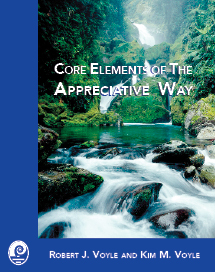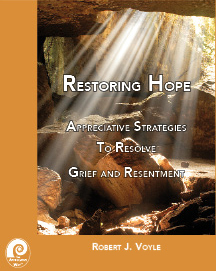

The Appreciative Way
Restoring HopePractical Appreciative Inquiry based strategies to effectively resolve grief and resentment. Subscribers receive monthly Appreciative Tips and notification of our upcoming training programs. Privacy: We never rent, sell, or share your email. What People Say"Of all the training I have been to, Rob's notes are the ones I keep coming back to time and again for practical resources."
"Rob's educational model brings body, mind and spirit together. I have been challenged intellectually, transformed spiritually, touched emotionally, gathering in communally. He came into my life at just the right time." Jean Holmes, Presbyterian Pastor Rob's combination of organizational savvy, teaching skills, theological and spiritual integration, and ability to rapidly build supportive, learning communities is quite simply the best in any of the churches today. Gray Temple, Episcopal Priest, Author & Coach |
What is Coaching?There are many definitions of coaching and what a coach does: listening partner, motivator, mentor, challenger, and several much more detailed. If you look up the word Coach in a dictionary you will find the word relates to "a means of transportation." We think this idea of a coach also applies to the field of Executive and Personal Life Coaching. A Coach is a Means of Getting From A to B
When we think of coaching people we can think of it simply as helping a person get from "State A" to "State B". Form this basic idea we would create our definition of coaching: Coaching is a collaborative relationship between a coach and a client in which the client is assisted to create and achieve their personal and/or professional goals by accessing and developing their environmental and internal personal resources. This basic model of going from A to B suggests that coaching requires knowing three things: 1. Where are you?A clear idea of where the person currently is (State A). You can not help a person get somewhere if you don't know where they are starting from. One of the big secrets of Appreciative Coaching is that you don't have to waste time gaining insight into why someone is where they are to help them get to where they want to be. We focus our time and energy on discovering what they need to achieve the goal rather than understanding why they haven't achieved it. 2. Where are you going?A clear idea of where they want to go (State B) which is also known as a preferred future state. Coaching is also open to the idea that the client's preferred future may change or unfold as they head toward B. However, while open to such transformation and in a spirit of equanimity, coaching is always oriented toward achieving a goal. 3. What do you need to get there?A clear idea of what resources the Client will need in order to get from A to B. The resources people may need vary enormously and could include tangible things such as money, material, personnel, or intangibles such as skills, confidence, or motivation. Coaching PerspectiveFrom a coaching perspective it doesn't really matter why or how you got to where you are, what matters most is knowing where you are, where you want to go next, and how you are going to get there. The Process of CoachingHaving established the goal, the process of coaching is about helping people access or acquire the resources they need to get from A to B. We call the tangible resources, or those things that are "external" to the client environmental resources. The intangible resources are personal or "internal" to the client. They essentially fall into two interrelated categories, skills and abilities, and motivation. There are many approaches to achieving coaching goals. The Appreciative Coaching approach we use at the Clergy Leadership Institute is based on the Appreciative Way, Rob and Kim Voyle's snythesis of Apprecaitive Inquiry, the change work of Milton Erickson, and insights from contemplative spirituality. >>
Read more of the Coaching Process Check Out Our Coaching ServicesAre you still wondering if our coaching would be helpful to you? >> Obtain the Coaching Letter of Agreement Coach TrainingIn addition to providing Coaching, the Clergy Leadership Institute also provides appreciative inquiry based Coach Training for those who would like to develop their coaching skills. >>
Appreciative Coach Training Our Certificate in Appreciative Coaching program is especially oriented toward training clergy to coach: peers, staff, and volunteers; and psychologists and counselors who are interested in coaching clergy and consulting to congregations. >>
Certificate in Appreciative Coaching |
|---|

